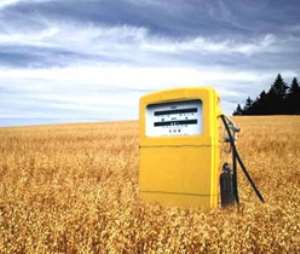
Gold Star Biofuels a subsidiary of Gold Star Farms Ltd., is cultivating five million acres of land in Ghana to plant jatropha for the production of biofuels for export.
According to the firm it has secured commitment from farmers to grow the plant in the country.
The company began cultivating jatropha in Ghana in 2005 and it has plans to start biofuels production soon at its farm in Nkawkaw in the Eastern region.
Biofuels production in Ghana gained public attention when Brazilian president, Luiz Inacio Lula da Silva signed an agreement with the Ghanaian government to produce sugarcane for biofuels in Ghana.
The agreement was signed while he was in Ghana for the United Nations Conference on Trade and Development (UNCTAD XII) meeting in April, 2008.
During the signing ceremony, da Silva said, “in Ghana we are developing a project that will result in growing 27,000 hectares (of sugarcane) for the production of 150 million litres of ethanol per year that are destined for the Swedish market.”
And then in November 2008 a Norwegian company ScanFuel Ltd., was reported to start operations outside Kumasi in the Ashanti region to produce biofuel. The reports said ScanFuel will initially cultivate Jatropha seeds, considered high oil-yielding on 10,000 hectares of land.
The company which has a Ghanaian subsidiary, ScanFuel Ghana Ltd said its Ghanaian unit has contracted about 400,000 hectares of land, with up to 60 percent reserved for biofuel production, “not less” than 30 percent for food production and the remainder for biodiversity buffer zones.
The current energy crisis is fueling the interest of many countries into alternative sources of energy, and biofuels appear to be the favourite.
Most of the companies that are cultivating plants, especially, jatropha for the production of biofuels, say it could grow on any type of land, which implies that productive agriculture land would not necessarily be used for that purpose.
The executive director of Gold Star Biofuels, Jack Holden was quoted as saying, “we like to find land where other things don't grow very well or land that has been fallow.” It is however, yet to be seen if these companies will keep to their word when it comes to the type of land they would utilise for the purpose.
Some of the companies also have long term projections for the industry, mostly in developing countries.
According to Holden, landowners who contract with Gold Star Biofuels to provide jatropha sign 50-year commitments. “When we go out into villages and see the four- and five-year-old children there, we know that a lot of them will be working on our farms and taking the place of their parents working there.”
These companies also believe that the biofuels industry would bolster the economies of countries that engage in it, and alleviate poverty by providing jobs.
Jack Holden reportedly said Gold Star Biofuels shares profits with landowners, pays good wages and supplies medical insurance to workers. Instead of hiring migrant workers, adding that Gold Star employs workers year-round. “It's all a part of Gold Star's commitment to be socially responsible,” he said.
He said Gold Star Biofuels is wholly owned by his Ghanaian wife Diana Holden.
Meanwhile, Gold Star has been awarded a contract to build small facilities throughout Chile to produce a combined total capacity of 77 MMgy of biodiesel from Chilean jatropha oil for Energy Partners Chile Ltd.
The biodiesel will be used in a B20 blend to produce electricity at Energy Partners Chile's 43-megawatt power generation facility in Degan on the island of Chiloe.
By Emmanuel K. Dogbevi
Email: [email protected]




 Avoid pre-registered SIMs, buyer and seller liable for prosecution – Ursula Owus...
Avoid pre-registered SIMs, buyer and seller liable for prosecution – Ursula Owus...
 Election 2024: Mahama has nothing new to offer Ghanaians, Bawumia is the future ...
Election 2024: Mahama has nothing new to offer Ghanaians, Bawumia is the future ...
 OSP files fresh charges against ex- PPA Boss
OSP files fresh charges against ex- PPA Boss
 Withdraw unreasonable GH¢5.8m fine against former board members – ECG tells PURC
Withdraw unreasonable GH¢5.8m fine against former board members – ECG tells PURC
 Akroma mine attack: Over 20 armed robbers injure workers, steal gold at Esaase
Akroma mine attack: Over 20 armed robbers injure workers, steal gold at Esaase
 Those who understand me have embraced hope for the future — Cheddar
Those who understand me have embraced hope for the future — Cheddar
 Ghana will make maiden voyage into space should Bawumia become President — Chair...
Ghana will make maiden voyage into space should Bawumia become President — Chair...
 Train crash: Despite the sabotage, we shall not be deterred and will persevere —...
Train crash: Despite the sabotage, we shall not be deterred and will persevere —...
 Tema-Mpakadan railway project a perversion of the original viable concept design...
Tema-Mpakadan railway project a perversion of the original viable concept design...
 Train crash: Elsewhere, everyone involved in the test will either be fired or re...
Train crash: Elsewhere, everyone involved in the test will either be fired or re...
